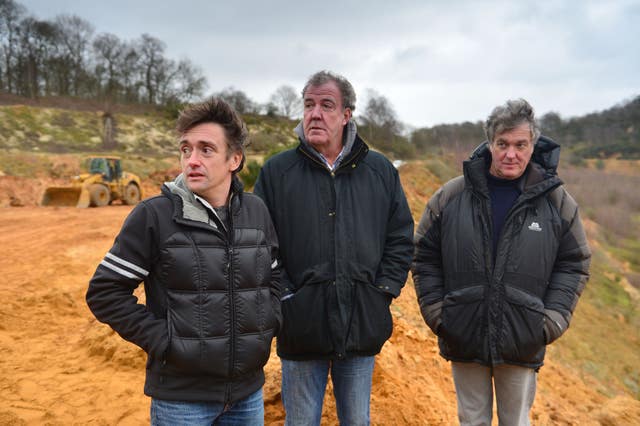The final outing of the Top Gear trio of Jeremy Clarkson, James May and Richard Hammond will be “quite weepy”, according to the executive producer behind their global success.
Andy Wilman, executive producer of The Grand Tour, Clarkson’s Farm and Top Gear, revealed during a talk at the Edinburgh TV Festival that the team will soon be releasing One For The Road – their last film together, 22 years after they first appeared in Top Gear.
Speaking to Jane Root, the BBC Two controller who approved the car show’s 2002 reboot, he said they wanted to go “unplugged” for their final outing, using “shit old cars”, which he said makes for better television than modern ones.
Wilman added that, as well as using “evocative cars they adore”, they chose to film it in Africa, which he described as “our favourite continent we’ve ever filmed in”.
“Not much happens, so anybody who thinks they’re going to get Avengers Endgame is going to be disappointed, because it is deliberately gentle,” he said.
“But their camaraderie is next level, and I think you can see it. They know that this is the last time we’ll do this, that and the other.”

“So it’s quite weepy.”
Wilman also spoke about the experience of working with Clarkson on the Amazon Prime series Clarkson’s Farm, and the secret of the programme’s success.
He said they did not need to set up comic scenes on the hit show because “you assume that things will go wrong” whenever Clarkson turns his hand to anything.
He said things as simple as Clarkson making blackberry jam work as television because he “doesn’t know what he’s doing”.
“We don’t actually need to set anything up. You plant all the mushrooms, hoping that there’ll be an infestation. They’ll all die, you know, because the odds are there. But other than that we’ve never set anything up. And so you kind of plan the big things, and then just let it go.”
He went on: “We’re going to build a car park or something like that, and you’ve got a big machine… he knows f*** all about anything mechanical. So you assume that things will go wrong there, and, because he can’t listen, or he’s got no patience, then he’ll just start driving something.
“And then, next thing you know ,it’s in a pond. And you’re like ‘We don’t set anything up’ – and it makes us so happy that we don’t have to.”
“You can just see it turning over – like, he knows that the scene he’s got to kind of conduct and orchestrate, points have got to land, and he knows it’s got to go somewhere. And his tabloid journalist capacity is quite extraordinary, because that’s how he began. That’s how we first knew him. He was a print journalist, and that’s never left him.”
In an earlier session, the theatre producer behind the original Baby Reindeer stage play talked about screen adaptations of theatrical works.
Francesca Moody said she loves “the idea that something that started in the theatre can become much bigger” through screen adaptation.
Speaking at a session on audio drama, she said that for someone who is “in the business of telling stories”, the ability of a play to become “globally significant” through adaptations is “amazing”.
“I really love the idea that something that started in the theatre can become much bigger, much more globally significant, can reach more people,” she said.
“When you are in the business of telling stories, that’s always exciting, to be able to put those tentacles out further. So for me that feels amazing. Quite ridiculous as well.”
Moody, who produced the original stage incarnation of Fleabag and currently has three shows at this year’s Edinburgh Fringe Festival, said she also likes the “symbiotic relationship” between stage and screen.
She said “the most obvious example is Fleabag”, which started life as a one-woman stage play at the Fringe in 2013, before being adapted into a multi-award-winning TV series, only to return to the theatre again.






